2022 cohort / 2021 cohort
Designs of the Oppressed shares the accumulated experience of the Design & Oppression network, weaved by educators and professionals who refuse to take part in reproducing the oppressions studied by Paulo Freire in Pedagogy of the Oppressed (1972) and Augusto Boal in Theater of the Oppressed (2000).
The course begins by summarizing the colonial history of design in Brazil, discussing other forms of oppression, and finish by availing the possibilities of designing for liberation. Guest lectures and conversations held by the network members will represent the variety of situations in which designers face oppression in Brazil. Beyond describing how the social issue manifests in Brazil from multiple perspectives, the lectures will show that Brazilians also have advanced pedagogies, theories, and practices to deal with that.
The course will run from 13/10/2022 to 17/11/2022, with synchronous meetings on Thursdays, 11:00 – 13:00 (GMT-3). Course materials will be available for asynchronous study. Only the participants who can attend at least 70% of the synchronous meetings will be qualified to earn a certificate from UTFPR. The course is free of charge and the course materials are open for consultation.
Introducing the Design & Oppression network
Design & Oppression is a network founded in 2020 to promote solidarity between all the struggles against oppression that, in one way or the other, puts design into question. This network extends the Latin American critical thinking that is already known in Education, Arts, and Sociology to Design. In addition to actions aimed at training critical designers, the network also promotes concrete and continuous social actions. The network has 376 subscribed members, 20% of them are professors, 46% students, and 33% design professionals, spread across several regions of Brazil and other Latin America nations.
Read more about the network’s history here:
VAN AMSTEL, Frederick M. C.; BATISTA, Sâmia ; SERPA, Bibiana O. ; MAZZAROTTO, Marco ; CARVALHO, Ricardo Artur P. ; GONZATTO, Rodrigo Freese . Insurgent Design Coalitions: The history of the Design & Oppression network. In: II PIVOT 2021 Virtual Conference, 2021, London, UK (Online). Proceedings of the II PIVOT 2021 Virtual Conference. London, UK: Design Research Society (DRS), 2021. p. 167-182. ISSN/ISBN: 9781912294435. https://doi.org/10.21606/pluriversal.2021.0018
Critical pedagogy principles
The network is weaved by complicators of different backgrounds and interests.
“We had no interest in concentrating privileges. However, we were concerned that letting anyone do whatever they wanted on the server could pave the way for trolls and other kinds of oppressors. Hence, we defined a role for the network founders with special privileges to delete messages and ban trolls: the complicator. These members are also responsible for articulating the debate, adding new problems, and preventing easy conclusions, acting in the opposite role of the facilitator in design thinking (Mosely et al., 2018). The complicator role was inspired by the joker role in the Theater of the Oppressed, a jack-of-all-trades who produces, stages, and directs the play (Boal, 2009).” (Van Amstel et al., 2022).
Read more about the network’s critical pedagogy here:
Serpa, B.O., van Amstel, F.M., Mazzarotto, M., Carvalho, R.A., Gonzatto, R.F., Batista e Silva, S., and da Silva Menezes, Y. (2022) Weaving design as a practice of freedom: Critical pedagogy in an insurgent network, in Lockton, D., Lenzi, S., Hekkert, P., Oak, A., Sádaba, J., Lloyd, P. (eds.), DRS2022: Bilbao, 25 June – 3 July, Bilbao, Spain. https://doi.org/10.21606/drs.2022.707
The network’s pedagogic principles introduced in the article above have been summarized in the following images that can be posted to social networks.
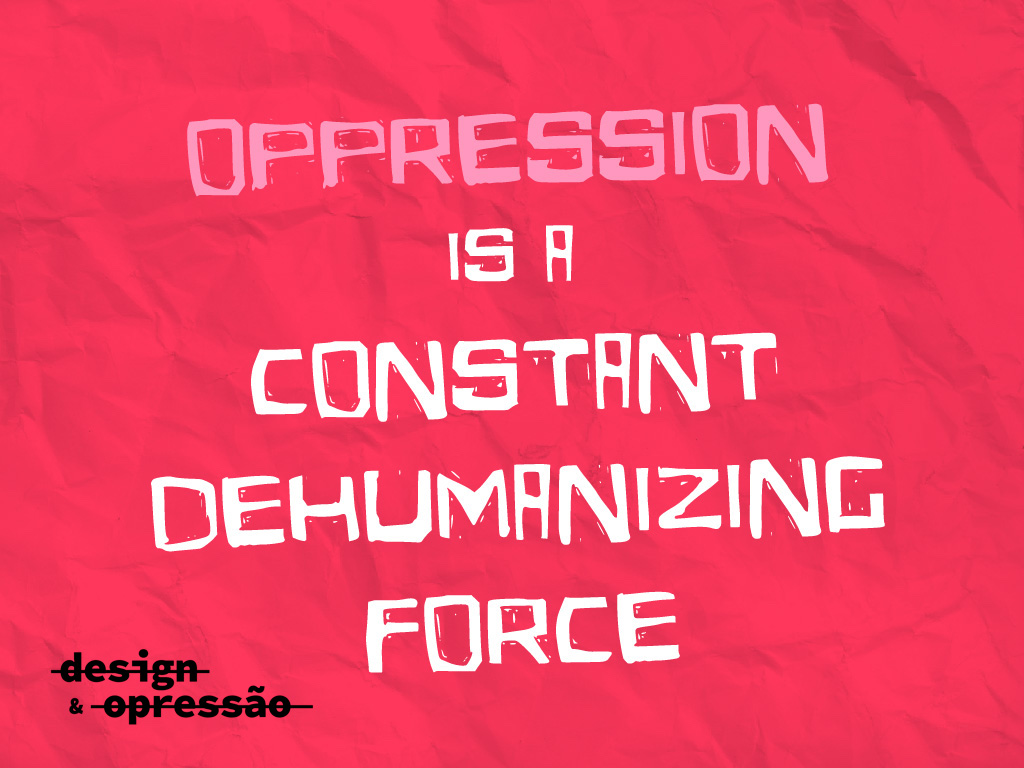
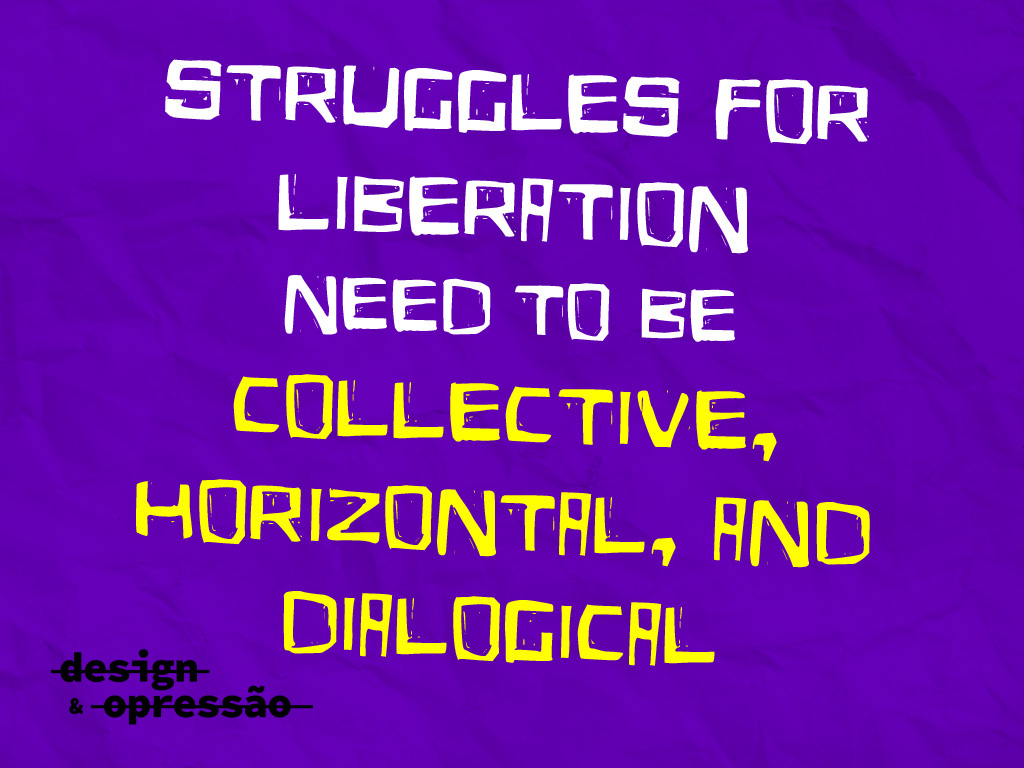
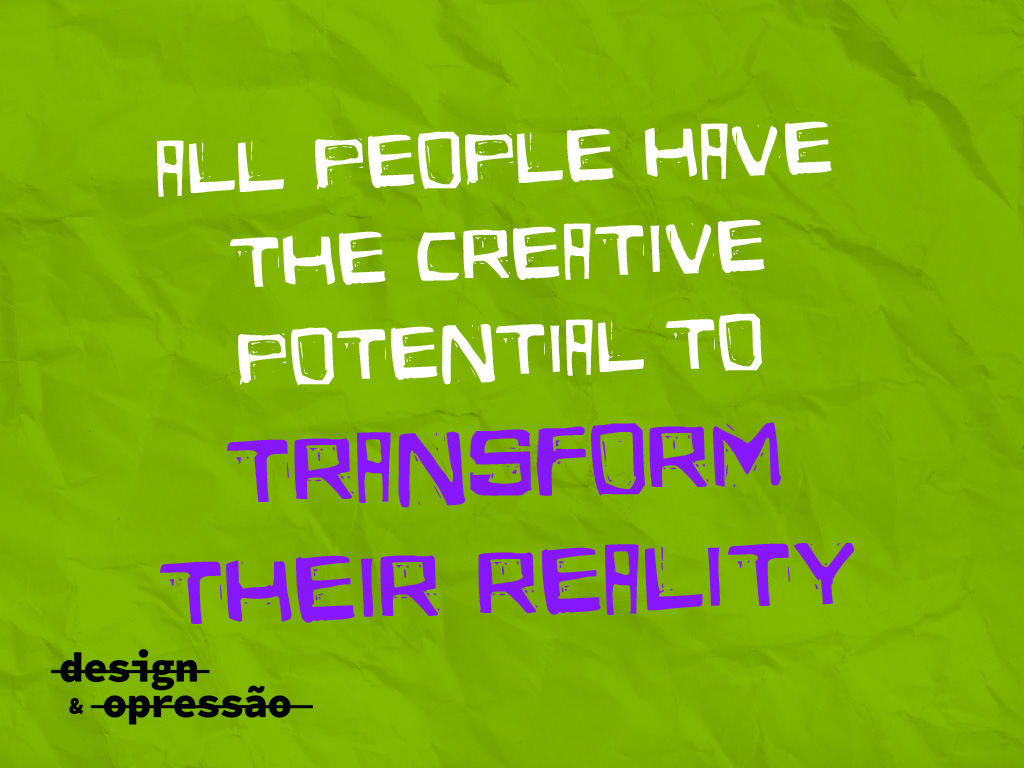
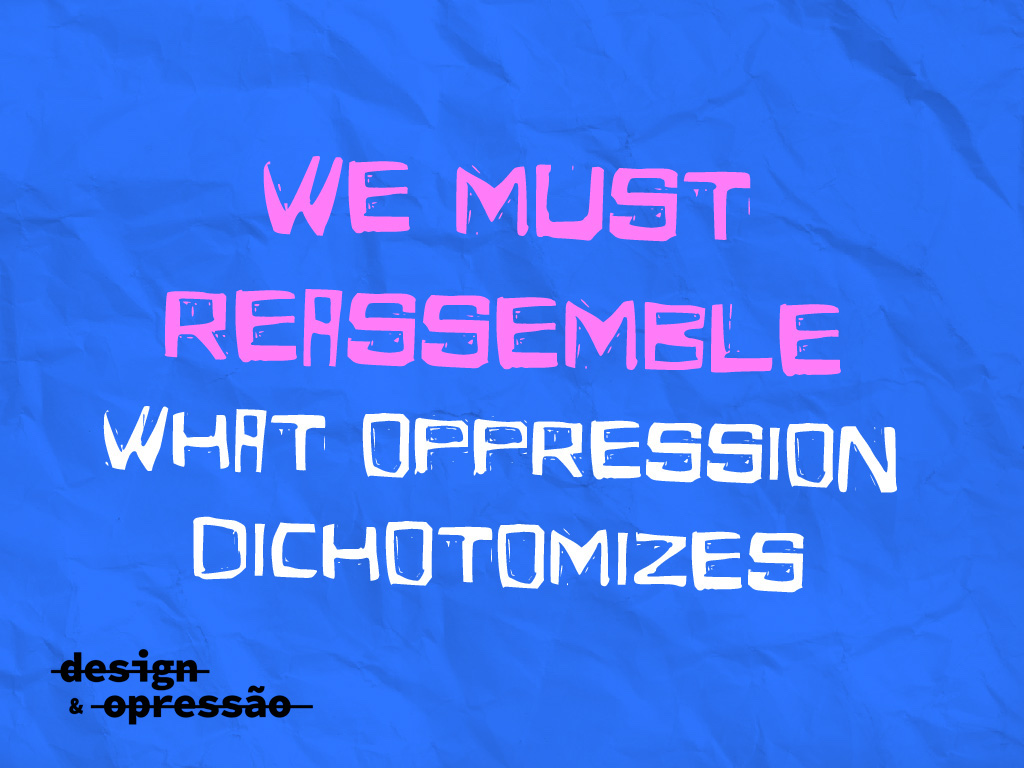

Music playlist
Listening Brazilian music that challenges oppression together is an essential part of the pedagogy.
Syllabus
Week 1 (13-19/10/2022) – Design and oppression relations
BASIC READINGS:
- Serpa, B.O., van Amstel, F.M., Mazzarotto, M., Carvalho, R.A., Gonzatto, R.F., Batista e Silva, S., and da Silva Menezes, Y. (2022) Weaving design as a practice of freedom: Critical pedagogy in an insurgent network, in Lockton, D., Lenzi, S., Hekkert, P., Oak, A., Sádaba, J., Lloyd, P. (eds.), DRS2022: Bilbao, 25 June – 3 July, Bilbao, Spain. https://doi.org/10.21606/drs.2022.707
- Van Amstel, F. M., Noel, L.-A., & Gonzatto, R. F. (2022). Design, Oppression, and Liberation. Diseña, (21), Intro. https://doi.org/10.7764/disena.21.Intro
ADDITIONAL READINGS:
- Freire, P. (1996). Pedagogy of the oppressed. New York: Continuum. Chapter 4 (pp 43-70)
Week 2 (20-26/10/2022) – Design, politics, participation, and Paulo Freire
LECTURES:
BASIC READINGS:
- Serpa, B.O.,and Batista E Silva, S.(2021) Solidarity as a principle for antisystemic design processes: two cases of alliance with social struggles in Brazil, in Leitão, R.M., Men, I., Noel, L-A., Lima, J., Meninato, T. (eds.), Pivot 2021: Dismantling/Reassembling, 22-23 July, Toronto, Canada. https://doi.org/10.21606/pluriversal.2021.0004
- Mazzarotto, M., and Serpa, B.O. (2022) (anti)dialogical reflection cards: Politicizing design education through Paulo Freire’s critical pedagogy, in Lockton, D., Lloyd, P., Lenzi, S. (eds.), DRS2022: Bilbao, 25 June – 3 July, Bilbao, Spain. https://doi.org/10.21606/drs.2022.710
- Freire, P. (1996). Pedagogy of the oppressed. New York: Continuum. Chapter 4 (pp 125-183)
ADDITIONAL READINGS:
- Freire, P. (1996). Pedagogy of the oppressed. New York: Continuum. Chapter 2 (pp 71-87)
- Mazzarotto, Marco. (2020) As contribuições de Paulo Freire para um Design Emancipatório. In: Abreu, Janaina M. and Padilha, Paulo Roberto (editors). Paulo Freire em Tempos de Fake News. São Paulo: Instituto Paulo Freire, p. 171-179.
- Serpa, B., Portela, I., Costard, M., & Silva, S. M. (2020, June). Political-pedagogical contributions to participatory design from Paulo Freire. In Proceedings of the 16th Participatory Design Conference 2020-Participation (s) Otherwise-Volume 2 (pp. 170-174).
- Serpa, B.; Mazzarotto, M. Eva viu a uva?: Desvelando Dimensões políticas em design com Paulo Freire. In: II Colóquio de Pesquisa e Design De(s)colonizando o Design, 2021, Fortaleza. II COLÓQUIO DE PESQUISA E DESIGN DE(S)COLONIZANDO O DESIGN – E-BOOK DE RESUMOS EXPANDIDOS. Fortaleza: Editora Nadifúndio, 2021. p. 154-158.
Week 3 (27/10/2022 – 02/11/2022) – Critical consciousness and oppression in design
LECTURES:
BASIC READINGS:
- Gonzatto, R.F., van Amstel, F.,and Jatobá, P.H.(2021) Redesigning money as a tool for self-management in cultural production, in Leitão, R.M., Men, I., Noel, L-A., Lima, J., Meninato, T. (eds.), Pivot 2021: Dismantling/Reassembling, 22-23 July, Toronto, Canada. https://doi.org/10.21606/pluriversal.2021.0003
- Saito, C., Serpa, B.O., Angelon, R., and van Amstel, F. (2022) Coming to terms with design wickedness: Reflections from a forum theatre on design thinking, in Lockton, D., Lenzi, S., Hekkert, P., Oak, A., Sádaba, J., Lloyd, P. (eds.), DRS2022: Bilbao, 25 June – 3 July, Bilbao, Spain. https://doi.org/10.21606/drs.2022.668
ADDITIONAL READINGS:
- Gonzatto, Rodrigo F. “2.5 Desenvolvimento e alienacao da existência: humanizacao e desumanizacao” In. Gonzatto, Rodrigo Freese. Usuários e produção da existência: contribuições de Álvaro Vieira Pinto e Paulo Freire à Interação Humano-Computador. Curitiba: Universidade Tecnológica Federal do Paraná. Programa de Pós-graduação em Tecnologia e Sociedade, 2018 (Tese de Doutorado). pp.101-125 http://repositorio.utfpr.edu.br/jspui/handle/1/3794
Week 4 (03-09/11/2022) – Feminist designs
LECTURES:
BASIC READINGS:
- Lina Bo Bardi and influenties and heritage from Bahia. TV UFBA (2014). https://www.youtube.com/watch?v=9fwtwODu4bo
- BUCKLEY, Cheryl. Made in patriarchy: Toward a Feminist Analysis of Women and Design. In: Design Issues, vol. 3, n. 2 (out, 1986), pp. 3-14.
- ROMMES, Els. Feminist Interventions in the Design Process. In: Gender in Science and Technology. 2014. p. 41-56. Disponível em: <https://www.jstor.org/stable/j.ctv1xxsrx.5?seq=1#metadata_info_tab_contents>. Acesso em: 09.02.2021.
- Griselda Flesler in Conversation with Anja Neidhardt and Maya Ober / depatriarchise design. Not a toolkit: a conversation on disconfort of Feminist Design Pedagogy. In: MAREIS, Claudia; PAIM, Nina. Design Struggles: Intersecting histories, Pedagogies, and Perspectives. Valiz, 2021.
ADDITIONAL READINGS
- SANTOS, Marinês Ribeiro dos. Gênero e cultura material: a dimensão política dos artefatos cotidianos. Estudos Feministas, v. 26, p. 1-8, 2018.
- SIMIONI, Ana Paula Cavalcanti. Regina Gomide Graz: modernismo, arte têxtil e relações de gênero no Brasil. Revista do IEB, n. 45, set. 2007. p. 87-106.
- WAJCMAN, Judy. Technofeminism. Polity Press, 2004.
Week 5 (10-16/11/2022) – Design and the coloniality of making
LECTURES:
BASIC READINGS:
- Van Amstel, Frederick M.C. Decolonizing Design Research. In: Rodgers, P., & Yee, J. (Eds.). (forthcoming). The Routledge companion to design research. Routledge.
- Duarte, Rogério. (2013). Notes on Industrial Design. In: Manuel Raeder (Ed.). Marginália 1, Exhib. cat., Bom Dia Boa Tarde Boa Noite, Berlin. Available at: https://www.bauhaus-imaginista.org
ADDITIONAL READINGS:
- Van Amstel, Frederick M.C and Gonzatto, Rodrigo Freese. (2020) The Anthropophagic Studio: Towards a Critical Pedagogy for Interaction Design. Digital Creativity, 31(4), p. 259-283. DOI: https://doi.org/10.1080/14626268.2020.1802295
- Gonzatto, Rodrigo F. and van Amstel, Frederick M.C. (2022), “User oppression in human-computer interaction: a dialectical-existential perspective”, Aslib Journal of Information Management, Vol. 74 No. 5, pp. 758-781. https://doi.org/10.1108/AJIM-08-2021-0233
- Gonzatto, Rodrigo F. and Merkle, Luiz E. (2016). Amanualidade em Álvaro Viera Pinto: desenvolvimento situado de técnicas, conhecimentos e pessoas” EDUCAÇÃO UNISINOS (Online), v. 20, pp. 289-298.
https://www.revistas.unisinos.br/index.php/educacao/article/view/11577 - #Fashion #SustainableFashion #FashionFutures Debunking hashtags to imagine generative fashion systems in times of ecological collapse. https://futuress.org/stories/fashion-sustainablefashion-fashionfutures/
- William Morris, Waste:https://www.marxists.org/archive/morris/works/1893/waste.htm
- Pham, M. H. T. (2020). ” How to Make a Mask”: Quarantine Feminism and Global Supply Chains. Feminist Studies, 46(2), 316-326. https://muse.jhu.edu/article/829508
Week 6 (17-20/11/2022) – Design, hope and utopia
LECTURES:
Gender-inclusive participatory design. Pricila Castelini. Text transcript.
BASIC READINGS:
- Giroux, Henry, e Peter McLaren. “Paulo Freire, Postmodernism and the Utopian Imagination: A Blochian Reading”. Education Faculty Books and Book Chapters, 1º de janeiro de 1997. http://digitalcommons.chapman.edu/education_books/107.
ADDITIONAL READINGS
- Felipe, Sônia Teresinha. “O conceito de utopia na proposta Paulofreireana”. Revista de Ciências Humanas – RCH. Editora UFSC, 1984.
- Silva, Claudia Bordin Rodrigues da. Projetar para a Esperança: prática de pesquisa em Design de Interação sobre as concepções de esperança de Paulo Freire, 2017. EM: CAPA – Culturas, Alteridade e Participação em IHC. http://capaihc.dainf.ct.utfpr.edu.br/livro/Ebook_CAPA-CulturasAlteridadesEParticipacoesEmIHC_2020.pdf
- Neto, Elydio dos Santos. Hope, utopia and resistance in the formation and practice of educators in a neo-liberal context. Revista de Educação do Cogeime, Ano 13, no.24, junho de 2004.
- Silva, Claudia Bordin Rodrigues da. Consciência e ação em design de interação: recursos e práticas educacionais abertas para o esperançar. 2019. Tese (Doutorado em Tecnologia e Sociedade)
- Excertos de “Paulo Freire: Ideais, Mitos e Utopias no Final do Séc. XX” – Universidade de Buenos Aires, Argentina. https://www.youtube.com/watch?v=VrBidYhH25A
Complicators

Bibiana Oliveira Serpa is a design researcher, a social educator and a feminist activist. She has experience in participatory projects and design for community emancipation in different locations in Latin America. Her research associates participatory and critical design approaches to politicization actions within social movements and seeks to understand ways for an engaged design practice having as reference popular education and feminism. She is co-editor of the International Journal of Engineering, Social Justice and Peace, a journal that seeks to explore scientific communication through counter-hegemonic practices.
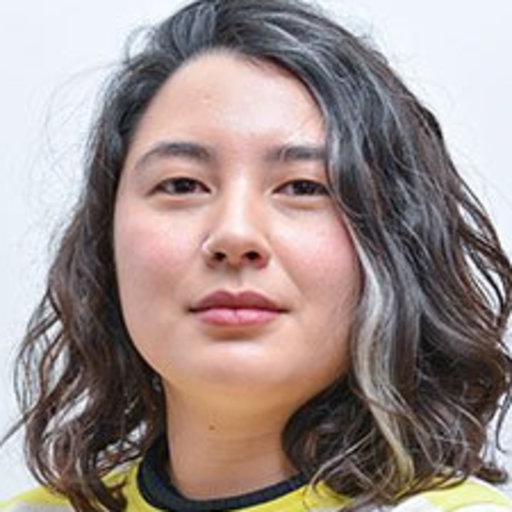
Carmem Saito is a PhD candidate at the Royal College of Art (London, UK). Her research explores fashion consumption and tacit knowledge in digital contexts, exploring the complexities and contradictions of the fashion industry with a specific focus on the sensing body, touch, and materials. The project takes a critical look at how systems of consumption are imagined, designed, and used by consumers, exploring how material tacit knowledge can contribute to rethinking the technologies and apparatuses that currently support and promote contemporary cultures of consumption.
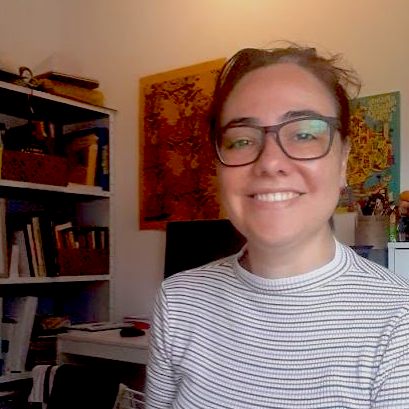
Claudia Bordin Rodrigues is design professor at Federal University of Technology – Paraná (UTFPR) and a researcher at XUE Participation, Interaction and Computing research group. Her research spread through the fields of Open Education and Interaction Design. She has a doctoral degree and a master degree from the Graduate Program in Technology and Society (PPGTE-UTFPR), where she studied Brazilian Human-Computer Interaction and Interaction Design education, based on critical and liberating perspectives. Claudia is an advocate of open educational resources (OER) that stem from collective projects and individual hopes, in line with Paulo Freire’s critical pedagogy. Her publications develop humanistic concepts for project-oriented studies on Science, Technology, Society, and Culture (STS), including the design and use of digital computer artifacts. In 2021, she cofounded the Laboratory of Design against Oppression (LADO) at UTFPR, a self-managed organization affiliated with the Design & Oppression network.

Frederick (Fred) van Amstel is Assistant Professor of Service Design and Experience Design at the Industrial Design Academic Department (DADIN), Federal University of Technology – Paraná (UTFPR), Brazil. His PhD thesis, accepted by the University of Twente, maps the contradictions faced by architectural design and service design in contemporary practice. Instead of eliminating them, expansive design harnesses contradictions as a source of change. Several articles on this topic have been published by international journals like Design Studies, Digital Creativity, Strategic Design Research Journal, and Building Research & Information. His recent research deals with the contradiction of oppression and the possibility of designing for liberation through decolonizing and hybridizing design. In 2021, he cofounded the Laboratory of Design against Oppression (LADO) at UTFPR, a self-managed organization affiliated with the Design & Oppression network.

Lindsay Jemima Cresto is a designer-professor at Federal University of Technology – Paraná (UTFPR) and a researcher in its Design & Cultura research group. She has a degree in Product Design from UFPR and a Master’s and Doctoral degree in Technology and Society (PPGTE-UTFPR). Together with Maureen Schaefer França, she runs Teoria do Design, a research project that problematizes design’s political, social, cultural, and technological dimensions. She develops research on the following topics: domestic interiors and women in the history of design, with a focus on cultural studies, gender studies and material culture.

Maureen Schaefer França is a designer-professor at Federal University of Technology – Paraná (UTFPR) and a researcher in its Design & Cultura research group. She has a degree in Graphic Design from UFPR and a Master’s and Doctoral degree in Technology and Society (PPGTE-UTFPR). Together with Lindsay Cresto, she runs Teoria do Design, a research project that problematizes design’s political, social, cultural, and technological dimensions. The goal is to increase the visibility of power relations in the field. Her research interests include the histories of minorities in design; fashion and body as technologies of domination and/or resistance; the critique of neutral, deterministic, and manicheist views on design; and the understanding of social markers (gender/sexuality; race/ethnicity; social class; age/Generation) and their intersections in design.
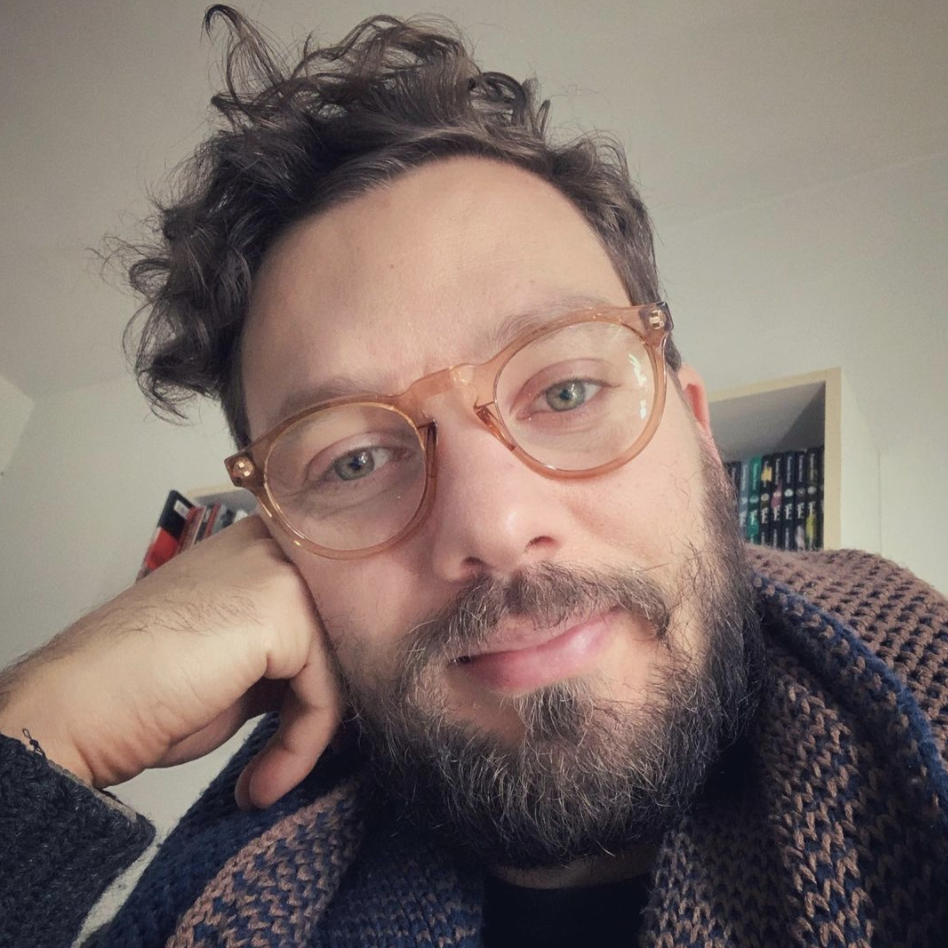
Marco Mazzarotto is a designer, filmmaker, musician, NGO TETO volunteer, and professor at UTFPR. He has a degree in Industrial Design from PUCPR and a Master and Doctor of Design from UFPR. He researches and works in the areas of participatory design, social innovation, critical design, and design pedagogy. As a designer, he has worked in communication projects both for large companies such as HSBC, GVT, Renault, Unicuritiba, as well as for various artists, cultural projects, and NGOs in the Curitiba area. For the Federal Government, he was responsible for the Brazilian International Humanitarian Assistance visual systems for new civil registration documents (Birth, Marriage and Death Certificates). As a volunteer for NGO TETO, he works in diagnosis, community development, and construction of emergency housing in precarious communities in Paraná. As a filmmaker, he wrote and directed the short film Fala, scheduled for release in 2021. He believes that Design cannot and should not be just a tool for the perpetuation of a society full of oppression and guided by unbridled and unsustainable consumption, but rather a factor generating improvements and transformations in all aspects of our lives. He firmly believes that can only happen through critical, horizontal, and participatory design approaches. In 2021, he cofounded the Laboratory of Design against Oppression (LADO) at UTFPR, a self-managed organization affiliated with the Design & Oppression network.

Pricila Castelini is a research analyst and Post-Doc researcher in the Post-graduate program at Federal University of Technology and Society at the Federal in Paraná (UTFPR). She has researched third wave of human-computer interaction in which she identified through the optics of French discourse analysis obstacles and barriers to access for women and excluded people in Computer Science. She is interested in study and research on innovation, leadership and critical education, as well as linguistics and discourse. She is an educator in Linguistics. Digital entrepreneur Castelini Digital.
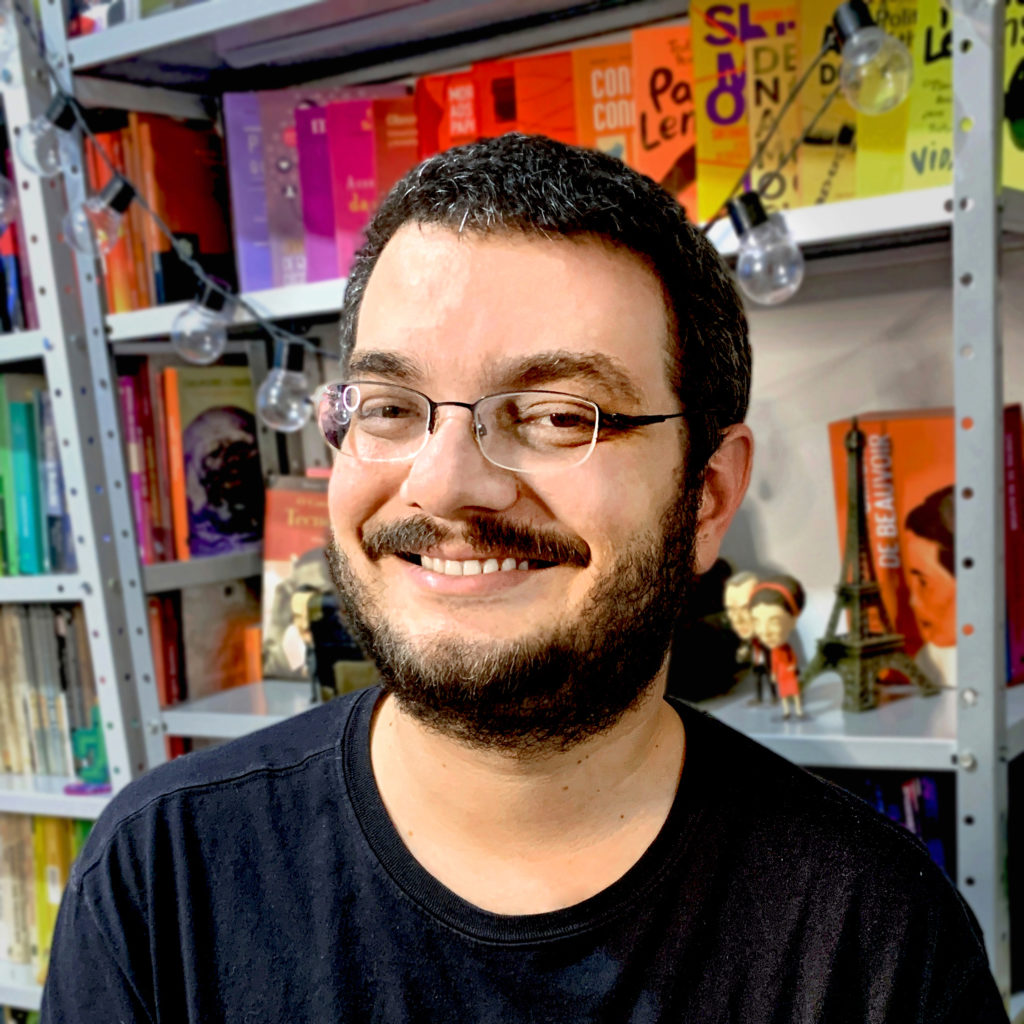
Rodrigo Freese Gonzatto is Assistant Professor of Interaction Design and Digital Culture at the Polytechnic School, Pontifical Catholic University of Paraná (PUCPR), Brazil. His research deals with relations of freedom and oppression in the social production of existence through digital technologies, mainly through the lens of an Interaction Design theory grounded on the STS studies of Latin-American authors like Álvaro Vieira Pinto, Paulo Freire, and Martín-Barbero. His PhD thesis recovers critical perspectives over the “user” concept in Human-Computer Interaction, analyzing how users were underdeveloped, historically despecialized, and removed from privileged design spaces. Rodrigo is a co-founder of Corais Platform (2011) — a free software suite and design livre platform for self-organized collectives, Rede Álvaro Vieira Pinto (2015) — a research community centered around the work and ideas of the Brazilian philosopher who inspired Paulo Freire and others, and Design & Oppression (2020) — a network of solidarity against the oppressions that manifest through the design.

Sâmia Batista e Silva is a designer and professor at the School of Visual Arts at the Federal University of Pará (UFPA), Northern Brazil. She holds a PhD degree in design (PPDESDI/UERJ) and a master’s degree in communication, languages and culture (PPGCLC/UNAMA). She is a researcher associated with the Design and Anthropology Lab (LADA/ESDI) and the Design and Oppression Network. Her research and activities are focused on developing the autonomy of urban and rural peripheral groups through participatory design investigations.
Host institution
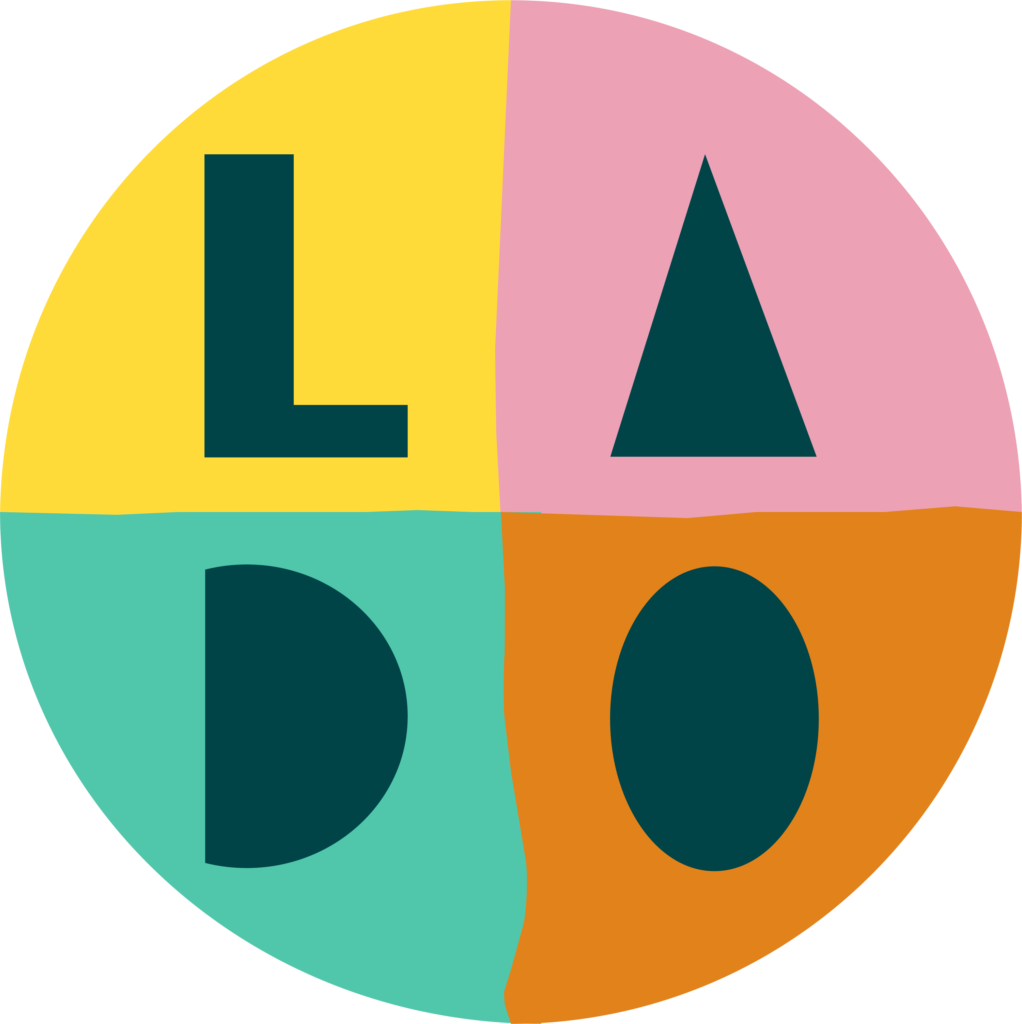
The Laboratory of Design Against Oppressions (LADO) is an open, horizontal space for critical education, scientific research, and transformative action at UTFPR. Attentive to the objectives of student involvement and participation in university outreach, LADO is organized through self-management, including collective decision-making and distribution of power among the several working groups created to coordinate each of its experiments. LADO experiments are shared on Instagram.
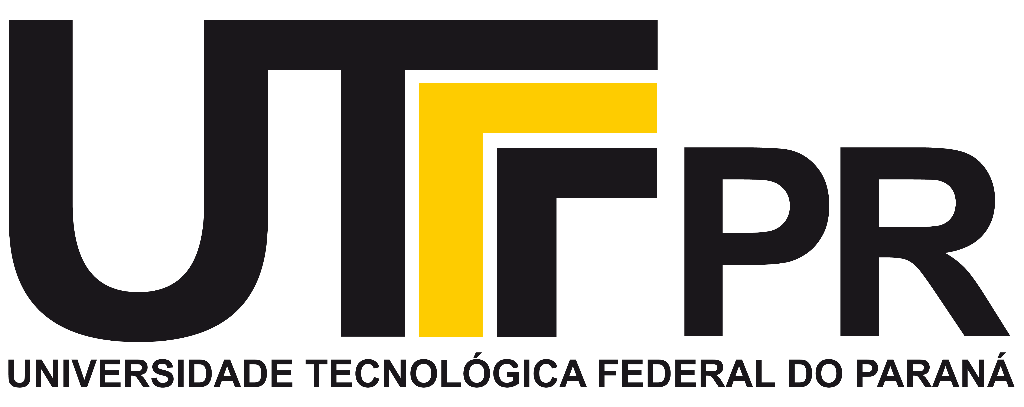
Federal University of Technology – Parana (UTFPR) is a higher education institution with over 110 years. From its start in 1909 as a Technical School targeted at low-income students, UTFPR has grown to become the first Brazilian University of Technology in 2005. Throughout its history, the University kept focused on Technology, with the aim to create solutions for problems that affect the Brazilian reality. UTFPR is spread through thirteen cities in the state of Paraná. It sums up to 33000 students and 3800 staff, distributed among 109 undergraduate programs, 58 master programs and 12 PhD programs, as well as specialization, and extension programs. Regarding International matters, the University has over 145 cooperation agreements with over 30 countries. It offers 86 double-degree programs and other possibilities to the academic community, such as joint research projects and exchange programs. For more information, check its international office.

